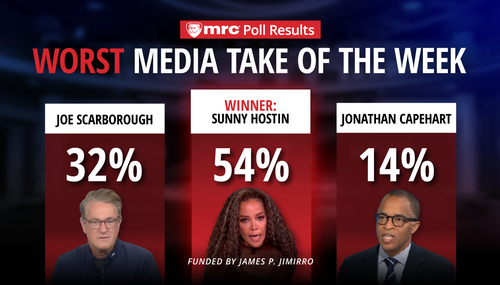The Obama administration-prepared Kool-Aid delivered to the Associated Press's economics writers on Monday must have been extraordinarily concentrated.
How else can you explain how the AP's Christopher Rugaber could have written the following — "The U.S. job market has steadily improved by pretty much every gauge except ... Pay" — without doubling over with laughter? No, Chris. The reason pay hasn't improved is because a whole lot of other "gauges" aren't where they should be.
In terms of real household income, the Census Bureau alums now working at Sentier Research told us last week that July's median of $54,045 was still 6 percent below the statistic's pre-recession peak.
Rugaber actually cited several reasons why pay hasn't meaningfully increased in real terms in several years, as the following excerpts will show (bolds and numbered tags identifying those reasons are mine):
The unemployment rate has sunk to a nearly normal 6.1 percent. Employers have added a robust 2.5 million jobs the past 12 months. Layoffs have tumbled.
Yet most people are still waiting for a decent raise. Friday's August jobs report confirmed that average hourly pay has crept up only about 2 percent a year since the recession ended five years ago - barely above inflation and far below the gains in most recoveries.
... The trend has mystified analysts.
... Some economists ... think wages have lagged because millions of people are still out of work - many of whom aren't counted in the unemployment rate because they're no longer looking for a job. [1]
But others say they fear that pay has stagnated because of trends that will persist even after the economy has moved closer to full health.
They note that companies have been making more use of temporary and part-time workers, [2] usually at lower pay, to replace full-time permanent jobs. And newer technologies have enabled businesses to produce more with fewer employees.
... overall inflation-adjusted wages have essentially flattened since 2009.
... So why has overall wage growth been so weak? Economists point to several factors.
The biggest is that there are still too many people desperate for work than is typical for a healthy economy. [3] That makes it easier for employers to fill jobs without raising pay.
There are 227,000 fewer people with jobs than in November 2007, just before the recession began. Yet the working-age population is up 15.3 million since then.
... In addition, fewer startup companies are being created, [4] holding back hiring.
So let's identify all of the genuine factors Rugaber cited and "pretty much ignored" when he made his opening paragraph's key assertion which are helping to hold wages down:
[1] — People who "aren't counted in the unemployment rate." Workers are afraid of losing their jobs because the chances of unemployment become a long-term problem are so high. Employers know this, and don't feel as compelled to hand out raises as they otherwise might be.
[2] —Employers are using more part-time and temporary workers because the cost of adding someone to the payroll is so high, and the cost of getting rid of them often includes an increase in the experience-based unemployment taxes they must pay. I will identify an additional factor which deserves separate recognition later.
[3] — The reason why "there are still too many people desperate for work than is typical for a healthy economy" is because ... we don't have a healthy economy. Blame Keynesian stimulus on steroids and the Federal Reserve's $4 trillion-plus in quantitative easing for that.
[4] — In past recoveries, start-ups and micro-businesses becoming much bigger ones have added large numbers of brand-new jobs in the process. This time around? Not so much. Federal, state and local regulations make starting up a new businesses far more difficult than it should be, and employment law strongly discourages taking on additional employees.
Seriously, Chris, how many factors do you have to cite yourself before you realize that your claim that "The U.S. job market has steadily improved by pretty much every gauge" is a complete crock?
Now let's add three more.
First, there's illegal immigration holding down the wages of entry-level and many blue-collar workers.
Second, there is the rampant abuse of H1B visas, enabling firms to hire cheaper high-tech and other educated workers while stiffing talented Americans they pretend aren't available.
Third, there is Obamacare, which is a major reason many employers are taking on more temporary workers instead of adding them directly to their own payrolls.
So now we're up to seven factors holding down wages. Other than those, "pretty much everything else" is fine. (That's sarcasm, folks.)
Chris Rugaber and his AP comrades need to put down the Obama administration koolaid and start reporting what Americans are really experiencing outside the Beltway.
Cross-posted at BizzyBlog.com.




